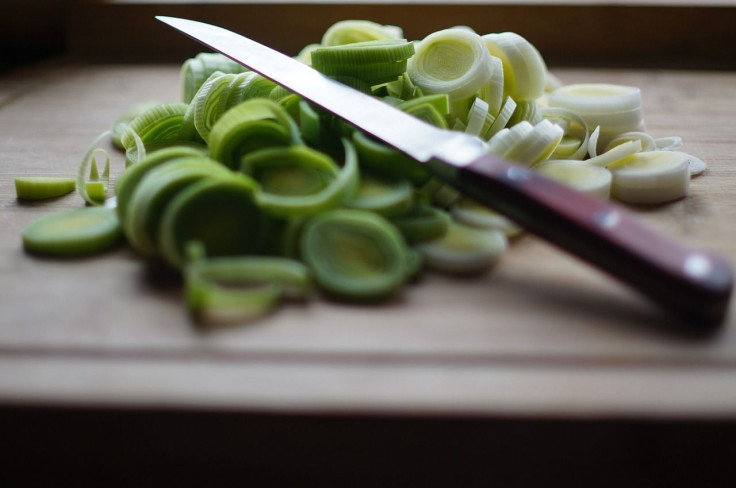Kitchen Utensils Spread Salmonella And E. Coli Bacteria: How To Avoid Cross-Contamination While Cooking

Chopping up cucumbers, tomatoes, carrots, and lettuce for a salad might take longer now that researchers from the University of Georgia's College of Agriculture and Environmental Sciences have found utensils can spread bacteria to different produce. In light of their findings, published in the journal Food Microbiology, researchers now recommend users wash utensils, like knives, peelers, and graters, before they use them to prepare another piece of fruit or vegetable.
"Just knowing that utensils may lead to cross-contamination is important," said the study's lead author Marilyn Erickson, an associate professor in the department of food science and technology at the University of Georgia, in a press release. "With that knowledge, consumers are then more likely to make sure they wash them in between uses." Not only should consumers be aware of the bacteria transfer, but upon further inspection, researchers also discovered certain types of produce lead to different degrees of contamination.
For example, if there's one bad tomato in the bunch, it could wind up ruining the entire meal, from the salad to side dishes and dessert. "For items like tomatoes, we tended to have a higher contamination of the knives than when we cut strawberries," Erikson said. "We don't have a specific answer as to why there are differences between the different produce groups. But we do know that once a pathogen gets on the food, it's difficult to remove."
In 2014, a team of researchers from Switzerland tested the common kitchen cutting boards and found they too were also able to transfer bacteria. Roughly 3.5 percent of the cutting boards randomly tested in homes were carrying E. Coli, and 6.5 percent of those tested in hospitals were contaminated with the drug-resistant bacteria.
Unlike many other disease-causing bacteria, E. coli can cause infection even if you only consume a small amount, according to the Mayo Clinic. Ground beef, unpasteurized milk, and fresh produce are all common carriers and ways people ingest the bacteria, leading to diarrhea, severe stomach cramps, vomiting, and fever. Certain vegetables, such as spinach and lettuce are highly vulnerable to contamination, however Erikson’s research team has found tomatoes are particularly good at cross contaminating through utensils.
Salmonella is another common bacteria that can be transferred through kitchen utensils. According to the Centers for Disease Control and Prevention, more than one million people fall ill of Salmonella infections every year in the United States, 380 of which are fatal. The multi-drug resistant bacteria cause diarrhea, fever, and stomach cramps within 12 to 72 hours of infection, lasting (on average) up to a week.
The U.S. Department of Health & Human Services warns illness-causing bacteria can survive in many places throughout your kitchen, including your hands. Washing hands for at least 20 seconds with warm or cold water and soap can stop the spread; scrub the backs of your hands, in between gingers, and under nails in two cycles, followed by rinsing and drying using a clean towel or air.
When prepping food, even if you're going to peel fruits and vegetables, it's important to wash them first because the bacteria can spread from the outside to the inside of the produce. Also, be sure to scrub firm produce like melons or cucumbers with a clean produce brush: Just cut away damaged or bruised areas, dry with a paper towel or clean cloth, and you're done.
However, the most recent findings recommend consumers to clean kitchen utensils and surfaces between each piece of produce as a new necessary precaution.
Source: Erikson M, Lia J, Cannon JL, Ortega YR. Contamination of knives and graters by bacteria foodborne pathogens during slicing and grating of produce. Food Microbiology. 2015.



























